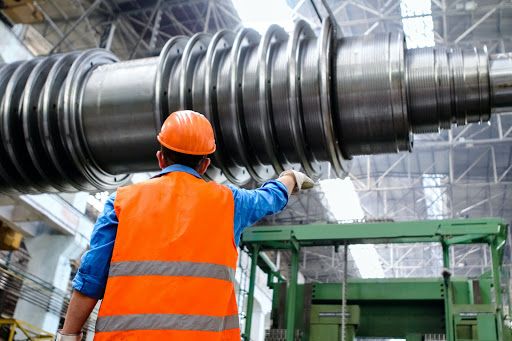The United States Department of Labor’s Occupational Safety and Health Administration sets strict safety standards and requirements that employers must follow. Some of these include providing a workplace free from hazards and updating operating procedures to ensure employees know how to stay safe while performing job duties.
Employers are legally obligated to implement techniques, provide equipment, and design workspaces that make their work environment safe for employees. Although most companies follow these rules and take the proper precautions so that workers avoid injuries on the job, workplace accidents may still happen.
Falls, Slips, and Trips
A fall can occur anywhere, whether you work on a construction site or in an office environment. To prevent slips, trips, and falls, it’s important to ensure the floor is free from debris and items, especially in high-traffic areas.
After cleaning, floors should be donned with warning signs that they’re wet so employees can avoid these areas until they dry. Injuries from slip and falls may be severe, so workers and employers need to be vigilant about ensuring surfaces are clean and dry.
Overexertion
If you have a job that’s physically demanding or you’re attempting to complete a physical job duty, you may suffer from overexertion. This medical condition occurs if you push your body too hard and can lead to an accidental injury.
You may be suffering from overexertion if you feel dizzy, sore, fatigued, or dehydrated. If you continue to push, you may pass out or cause serious injury to your joints or muscles. If you’re engaging in a demanding activity at work, take frequent breaks and stay hydrated. Go slowly and pay attention to your form and how your body moves as you work.
Pulled Muscles
Lifting heavy items or performing physically demanding job duties may lead to back injuries or pulled muscles. These injuries may cause permanent damage or require long-term treatment.
If your job involves physical activities, take a few moments to warm your body up before starting work. Educate yourself on good form for the movements you need to make and be sure you have the proper equipment, such as a lifting belt for back support.
Being Hit By Falling Objects
If you’re working on a construction site, work materials and tools can easily become flying objects and cause serious injury. When you’re working from an elevated position or performing job duties that require you to reach up, it’s important to pay attention to where other workers, tools, and materials are at all times. Prevent injuries from falling objects by:
- Using tool lanyards to secure loose tools instead of pockets or unsealed holders.
- Keep items at least three feet from elevated thresholds.
- Ensure all workers on site are wearing personal protective equipment (PPE), including hard hats.
- Keep loose tools and materials away from guardrails.
To prevent injuries from falling objects, maintain an awareness of your equipment and where other employees are working.
Crashes and Collisions
If you’re a rideshare driver, operate a company vehicle, drive a truck, or use a vehicle to deliver goods, your car is considered your workplace. Anything can happen on the road and it’s not always guaranteed that your employer has a comprehensive insurance policy.
If you get injured in a car accident while working, you may be entitled to financial compensation for your medical bills. Truck accidents or car accidents that occur while you’re on company time may be covered by your employer’s insurance. If there’s a dispute on who was at fault for the incident or if your employer argues whether or not you were on company time, you may need the assistance of a car accident lawyer to ensure your medical expenses are covered.
Cuts and Lacerations
Whether you work in an office environment or at a manufacturing facility, you risk experiencing a cut or laceration if you come into contact with a sharp object. The culprit may be a pair of scissors, a paper cutter, or industrial manufacturing equipment.
If you’re working with equipment that has sharp edges, handle it carefully, and always be aware of where the sharp edges are. Ensure you and your co-workers are trained on how to operate dangerous equipment and always have a first-aid kit nearby in case an employee experiences an injury.
Inhalation of Toxic Fumes
Mixing cleaning products together or different types of chemicals may cause the presence of toxic fumes. If you inhale these fumes, you could experience dizziness, a sore throat, or sinus irritation. Before utilizing any chemicals at work, be sure you understand the ingredients and are educated about potential fumes. Handle these items carefully and use protective equipment when needed.
Overexposure to Loud Sounds
Working in an environment that exposes you to loud noises, such as a construction site or concert venue, may cause permanent hearing loss or damage to your eardrums. If your job exposes you to these sounds, wear earplugs to prevent hearing damage.
Running Into Objects and Equipment
If you’re distractedly walking through the workplace, it’s easy to run into objects or equipment in your path, which may cause injury. To prevent this injury from occurring, pay close attention as you’re moving through your work environment. Don’t read documents or carry items that will distract you as you walk.
On the Job Violence
According to OSHA, about two million workers are affected by workplace violence each year. In 2017, 18,000 employees incurred injuries due to on-the-job violence. Co-workers who lose their temper are dangerous and may lash out, causing injury to other employees. Make sure your workplace is an open forum for employees to talk about their problems and implement a zero-tolerance policy for violence.
Repetitive Motion Injuries
When you repeat the same motion over again for an extended period of time, you may experience a repetitive motion injury. Carpal tunnel syndrome is a common repetitive motion injury synonymous with using a computer for an extended period of time.
Your muscles and tendons are strained by the repetitive action, causing pain and damage. To prevent this injury, take frequent breaks from your work and use ergonomic equipment that supports your body as you perform these repetitive motions.
Reporting an Injury at Work
If you or a co-worker experiences an injury at work or is beginning to feel pain from job duties, it’s important to:
- Report the injury to your employer immediately.
- Analyze the situation to identify if proper safety precautions were taken.
- Seek medical treatment.
Even if the injury isn’t severe, if you need to make a worker’s compensation claim, records showing when your injury began are crucial for the validity of your claim.
Your employer should take the proper precautions to ensure injuries don’t occur in the workplace. If you need to make a claim for your workplace injury, stay up to date on the latest worker’s compensation laws to ensure you’re receiving proper compensation for your injury. If you seek medical treatment for your injury, your medical expenses may be covered.
It’s your employer’s responsibility to provide a safe work environment and protection equipment so you can perform your job cautiously and properly. If a workplace accident occurs while on the job and you seek medical treatment, you may be entitled to compensation to cover your expenses.







